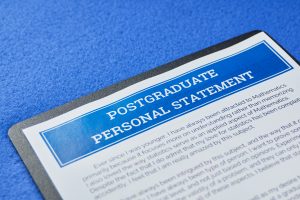When you start thinking about writing your personal statement, it can be more challenging if you’re applying for a subject which is not commonly taught in schools. Engineering is a very popular course choice with great career and development opportunities. It also has a wide variety of choices within the degrees available. This can make it even more difficult when it comes to structuring your personal statement for engineering.

STARTING UNIVERSITY – 5 TIPS FOR NEW STUDENTS
What are you applying for?
The first thing is you need to be fairly confident which sort of engineering you are planning on applying for. Some universities, including Oxbridge, offer general engineering for the first two years, followed by the option to specialise in the third (and fourth) years. Others offer specialisation into civil, mechanical, electrical, aeronautical and so on from an earlier stage, even at application. Once you know which universities you are interested in, and the course you intend to apply for, it can really help with structuring your personal statement for engineering.
Do you have the skillset?
Secondly, you need to have an outline of the skills, qualifications and wider reading you want to comment on. Before you write anything jot down in rough all the things your might want to include that are relevant. This might include:
- Courses you’ve been on such as Headstart
- CREST or Industrial Cadet awards
- Books on engineering
- Lectures you’ve attended (virtual or in person)
- Scholarships such as Arkwright
What is your USP?
Thirdly, you need to consider your unique selling point. What is it that makes you the ideal candidate? How are you going to show your passion for engineering as a subject. A formulaic personal statement will not meet this criteria. I’m not going to give you a template to fill in (sorry!). It is important to have in mind the key ‘take away’ you want the admissions tutor to know about you. It’s worth emphasising this at the start and/or the end (it’s nice if it’s both as it bookends the statement well but don’t repeat yourself!).
Once you start writing, you want to begin with a bold, punchy statement that gives a flavour of you are and why you want to study engineering.
An example might be:
‘As a keen reader, aiming to keep my knowledge of engineering developments current, I often turn to magazines produced by the IET. My passion for electrical engineering was ignited when I read an article on freeze-thaw batteries as the benefits for society are impressive. This led on to further reading around development of low-cost, renewable electricity provision and the importance of considering low-cost materials as alternatives to more rare options currently in use…’
Or
‘Theo Jansen said ‘The walls between art and engineering exist only in our minds’. As a student of art, physics and mathematics I am fascinated by the interplay between aesthetic design and practical construction. Creative use of engineering to build structures to serve humanity fascinates me. I believe this is seen in civil engineering constructions throughout time. No one can doubt the beauty of the Pyramids, the Hoover Dam or the Golden Gate Bridge…’

WHAT CAN YOU DO IN 5 MINUTES? STUDY TIPS FROM TOP TUTOR JESSICA
Back It Up
Bear in mind that whatever you talk about you need to be able to back up at interview. If you say ‘I want to do mechanical engineering because I’m fascinated by F1 cars’, you need to really know about the engineering of those cars. How does the internal combustion engine work? How have they engineered for safety? What new features are on this year’s car that show interesting engineering? You need to demonstrate passion, but this needs to be backed up by genuine interest. It is advisable to have more than one example. Admissions tutors will be looking for breadth as well as depth, particularly for highly competitive courses. This is especially true for the general engineering courses.
You also need to make sure you mention skills you’ve developed that will benefit you in an engineering degree, and give some evidence to back this up. How have you demonstrated attention to detail? When did you show mathematical aptitude? Where did you show leadership skills?
An example could be:
‘Obtaining a gold certificate in the Maths Olympiad enabled me to showcase my mathematical skills and take on a challenge to excel. I enjoyed applying my maths knowledge to problems beyond the specification and am keen to improve on my skills during my degree.’
Or
‘Having obtained my Young Leader Qualification by supporting my local Brownie unit for the past two years, I have developed my leadership skills. I am comfortable designing activities for a meeting, delegating tasks to other members of the team and resolving conflicts between the children.’
Again, make sure this is accurate and don’t exaggerate! There’s often a temptation to over-inflate your involvement in things. Much like with the topics you are claiming to be interested in, you may get challenged on this at interview so make sure you are honest!
Educational Insights
Finally, you should work in something of what you’ve learnt at school and how it sets you apart form others. You might talk about how your Design and Technology A-level has developed your technical drawing skills, or how discussion of superconductor magnets in physics has led you to consider the challenges of engineering the particle accelerator at CERN. This is also an opportunity to discuss future challenges in engineering.
An example might be:
‘My studies in Physics introduced me to the engineering challenges inherent in the development of nuclear fusion power. The need for containment of plasma at high temperatures presents an intriguing problem and one which I decided to explore further by attending a virtual lecture on the ITER reactor.’
The best statements will interwork discussion of engineering you’ve found exciting and the skills you’ve developed whilst exploring those topics. Make sure everything you say is relevant and links back to showcasing why you are a great choice of student. Get a teacher or tutor you trust to look over your statement, but don’t go to too many people, as everyone will have a different idea!
Remember most of all, this is YOUR statement. This is your chance to showcase your love for engineering. The best way to structure your personal statement for engineering is to be yourself and let your passion shine through!
A bit about the author, Joanna P:
 As a fully qualified teacher of Physics with 10 years teaching and tutoring experience including as Head of Department in a very successful Independent Girls’ School, Joanna’s undergraduate degree was in Natural Sciences from Gonville and Caius College, University of Cambridge, and her MSc in Education was from Loughborough University.
As a fully qualified teacher of Physics with 10 years teaching and tutoring experience including as Head of Department in a very successful Independent Girls’ School, Joanna’s undergraduate degree was in Natural Sciences from Gonville and Caius College, University of Cambridge, and her MSc in Education was from Loughborough University.
An experienced 1-2-1 tutor and examiner for Edexcel, Joanna has as excellent track record of results in my students. This includes improved grades up to three times above their university predictions from school. She is also a Fellow of the Chartered College of Teaching and a Chartered Science Teacher, sitting on the Education Group for the Association for Science Education. She also serves as Regional Secretary for the East Midlands, showing her commitment to exceptional physics and science teaching practice.


